Understanding the Deep Impact of Addiction on Relationships
Addiction is a complex disease that extends beyond the individual, deeply affecting romantic, familial, and social bonds. Its ripple effects can erode trust, create emotional distance, and foster conflict, making recovery a challenging yet hopeful journey. This article explores the profound ways addiction influences relationships, signs of deterioration, and strategies for healing and rebuilding trust.
The Ripple Effect of Addiction on Relationships
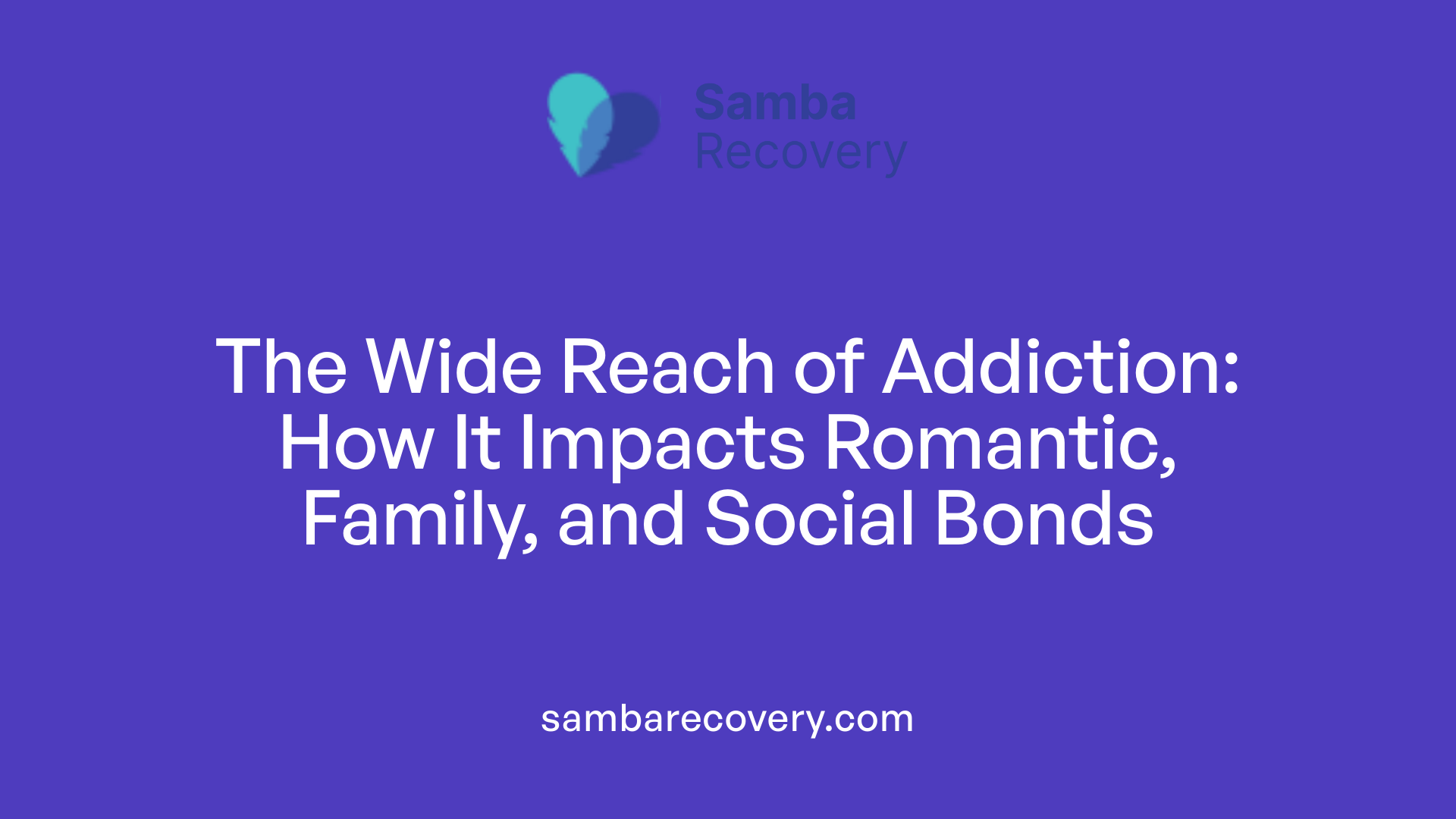
What are the effects of addiction on romantic, familial, and social relationships?
Addiction profoundly influences all types of relationships—romantic, family, and social—by creating barriers to trust, open communication, and emotional intimacy. When individuals struggle with substance use, they often lie, hide their behaviors, or manipulate others, which fractures trust and fosters feelings of betrayal. As honesty diminishes, relationships become strained, leading to resentment and emotional distance.
Communication breakdowns are common in relationships affected by addiction. Many individuals become defensive, aggressive, or withdrawn, making it difficult for loved ones to connect or resolve conflicts effectively. These interactions often escalate to misunderstandings, arguments, or even violence, especially if substance-induced aggression occurs.
Addiction can also cause emotional and physical neglect. Loved ones may feel abandoned or unimportant as the addicted individual prioritizes their substance use over family or social responsibilities. This neglect leads to feelings of hurt, loss, and sometimes a sense of betrayal, further weakening bonds.
Financial difficulties are another consequence, as addiction can lead to reckless spending, theft, or misuse of joint resources, creating stress and conflicts within families or partnerships. These financial strains often accompany behavioral changes, including decreased responsibility, increased impulsivity, and sometimes criminal activity related to obtaining substances.
Furthermore, addiction fosters enabling behaviors and codependency, where family members or partners excessively support or protect the addicted individual at the expense of their own well-being. This dynamic perpetuates dependence and delays recovery, complicating efforts to restore healthy relationships.
Overall, the cycle of addiction results in persistent conflicts, mistrust, and emotional turmoil. Recovery and healing require comprehensive support, including professional treatment, family counseling, and ongoing communication, to rebuild trust and foster healthier, more resilient relationships.
Trust and Intimacy in the Shadow of Addiction
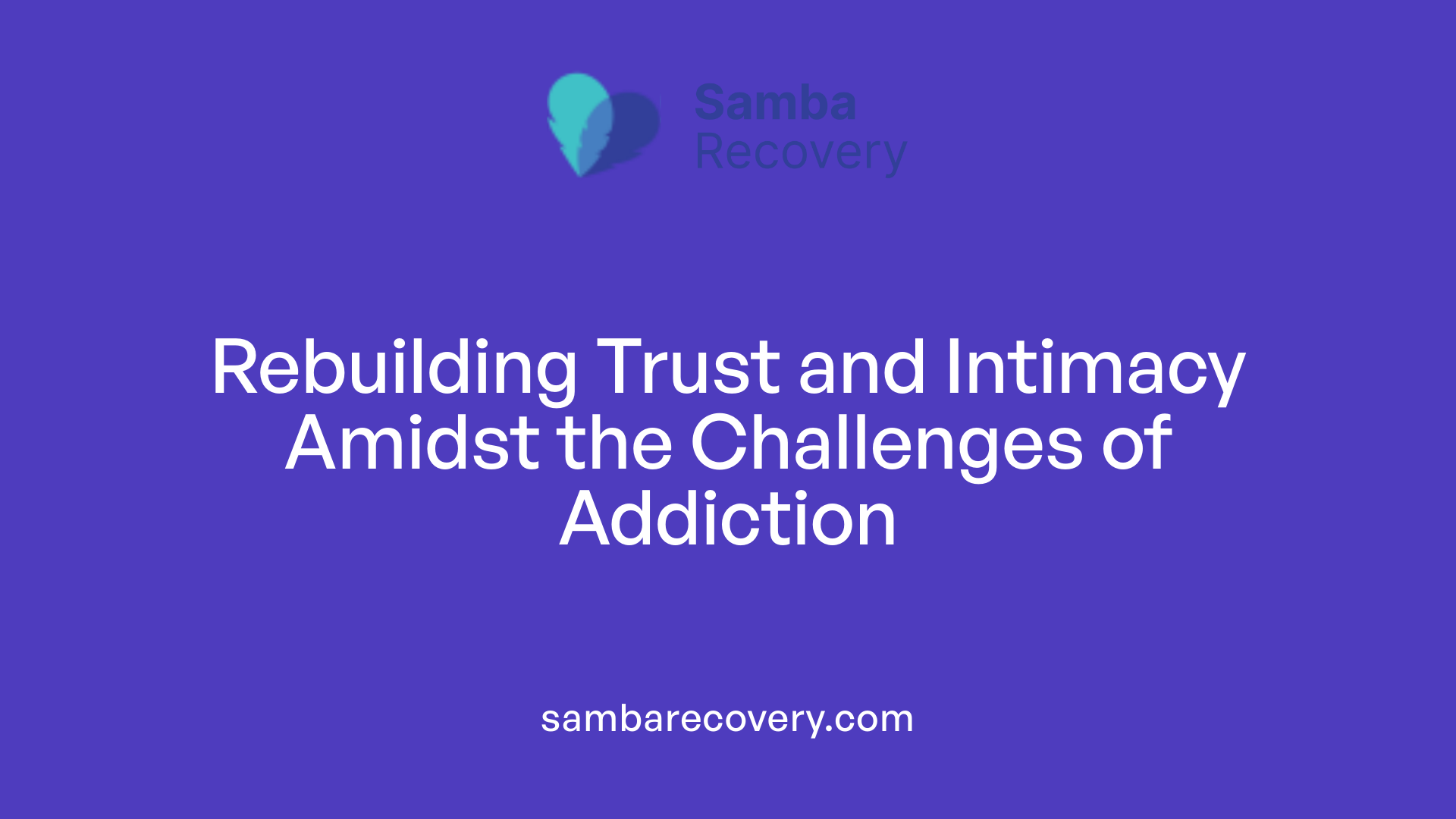
How does addiction impact trust, intimacy, and emotional connection in relationships?
Addiction plays a profound role in damaging trust, intimacy, and emotional bonds between partners, family members, and friends. When substance abuse or addictive behaviors take hold, emotional distance often follows. Partners may resort to secrecy and dishonesty to hide their addiction, which erodes the foundation of mutual trust. Frequent lies, concealment, and manipulation can create feelings of betrayal, making it difficult for loved ones to believe or rely on the addicted individual.
This secrecy fosters a sense of disconnection, as open and honest communication diminishes. The addicted person might become withdrawn or defensive, avoiding meaningful conversations or sharing feelings. Such emotional withdrawal diminishes emotional closeness and hampers intimacy, leaving loved ones feeling neglected or unimportant.
Conflicts and misunderstandings become common as addiction-related issues surface, often leading to misunderstandings, resentment, and increased arguments. The emotional toll extends beyond just the superficial; feelings of helplessness, shame, guilt, and abandonment can manifest, further deepening the divide.
The strain is not only mental and emotional but also physical and social. Substance abuse may lead to social isolation, financial struggles, and even abusive behaviors, which serve to weaken the relationship’s stability.
Despite these challenges, recovery and rebuilding are possible. Engaging in counseling, support groups, and open communication can help partners work through past hurts, learn to trust again, and rekindle their emotional connection. Restoring trust involves patience, consistency, and a genuine willingness to rebuild from the ground up. By addressing the root causes of addiction and its effects, many relationships can heal, and intimacy can be restored to foster a healthier emotional partnership.
Recognizing the Signs of Relationship Deterioration
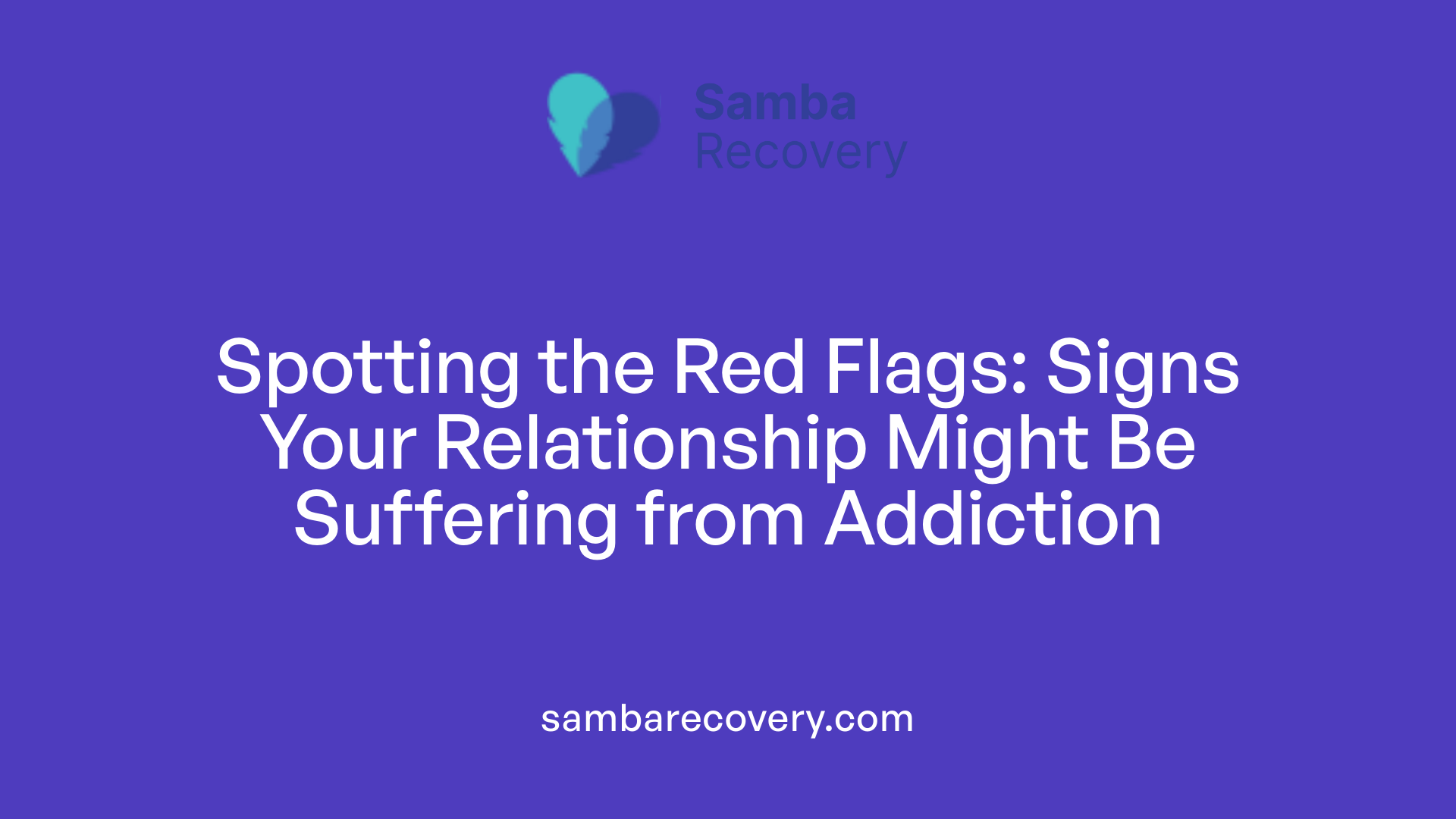
What are the signs that a relationship is deteriorating due to addiction?
Relationships affected by addiction often show clear warning signs that indicate struggles under the surface. Frequent conflicts centered around substance use are common, with partners arguing over responsibilities, finances, or the impact of addiction on daily life. Over time, emotional distance can develop as one partner becomes increasingly withdrawn or preoccupied with their substance use.
Secrecy and cover-ups also become prominent, with individuals hiding their activities or lying about their whereabouts and behaviors. This erosion of honesty leads to a breakdown in trust, making it difficult for partners to feel safe or secure. Partners may start to enable the addict’s behavior by making excuses or shielding them from consequences, which further deepens dependency and codependent dynamics.
Emotional exhaustion is a major sign, manifesting as feelings of frustration, depression, and irritability. Both partners may feel drained, with little energy left for nurturing their relationship. Physical and emotional withdrawal may occur, with one or both partners losing interest in intimacy, social activities, or maintaining meaningful connections outside the relationship.
Behavioral indicators also include impulsive or reckless actions, like neglecting responsibilities, engaging in risky behaviors, or using sex or other compulsive acts to maintain a sense of connection. Children and other family members often feel the ripple effects, experiencing hurt and confusion.
Recognizing these signs early is vital. If left unaddressed, these issues can escalate, leading to increased tension, domestic conflicts, or even violence. Seeking help from mental health professionals, support groups, or family counseling can provide the necessary tools for managing addiction and repairing relationships. Acting promptly can prevent further damage and pave the way toward healing, trust rebuilding, and healthier future interactions.
Strategies for Healing and Repair
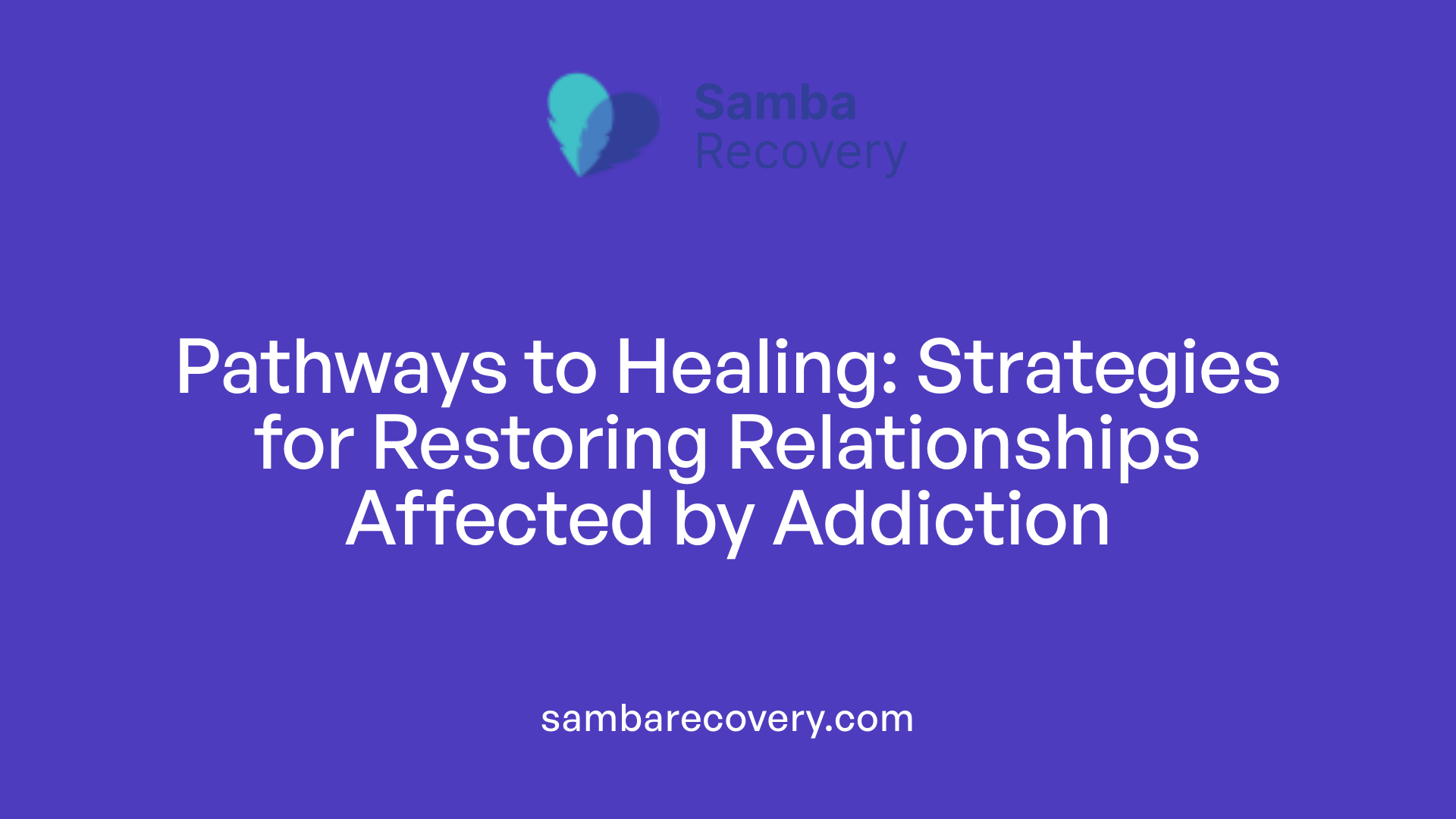
What strategies can help repair and heal relationships affected by addiction?
Rebuilding trust and fostering a healthy connection after addiction require deliberate, compassionate efforts. Central to this process is open and honest communication. Both partners or family members need to feel safe sharing their feelings, concerns, and fears without judgment. This transparency helps in acknowledging pain, addressing misunderstandings, and setting the stage for healing.
Therapy and counseling—such as individual, couples, or family therapy—are vital components. These professional services create a supportive environment where underlying issues can be explored, and strategies for rebuilding trust can be developed. Therapy also helps in learning new ways to communicate, cope with emotional pain, and establish healthy boundaries.
Setting healthy boundaries is crucial for maintaining safety, respect, and understanding in the relationship. Boundaries help prevent slipbacks into old patterns and promote mutual respect. Building trust is a step-by-step process that involves consistent, reliable actions over time. Small commitments, kept faithfully, can gradually restore credibility.
Education about addiction plays a significant role in recovery. Understanding that addiction is a disease helps both partners remove blame and develop more compassion. Support groups and informational resources provide ongoing education and encouragement.
Patience and realistic expectations are essential components. Healing is rarely instantaneous. It takes time for wounds to mend and for trust to be restored. Celebrating small victories—such as improved communication or shared understanding—can reinforce positive changes. Recognizing progress and offering positive reinforcement encourages continued effort.
In conclusion, a combination of honest dialogue, professional guidance, boundary setting, ongoing education, patience, and celebrating small steps can significantly enhance the healing process. With time and commitment, relationships affected by addiction have the potential to grow stronger and more resilient.
Treatment and Recovery Strategies for Individuals and Couples
What treatment options and recovery strategies are available for individuals and couples dealing with addiction?
Effective recovery from substance use disorder involves a combination of various treatment options tailored to individual and relational needs. For individuals, counseling is fundamental, often incorporating therapy approaches like cognitive-behavioral therapy (CBT) or motivational interviewing to address underlying issues and develop coping skills.
Medication-assisted treatment (MAT) is also frequently used, especially in cases of opioid or alcohol dependence. Medications such as methadone, buprenorphine, or naltrexone can help manage cravings and withdrawal symptoms, increasing the likelihood of long-term sobriety.
Support groups play a critical role in sustainable recovery. Groups such as Alcoholics Anonymous, Narcotics Anonymous, and various family-focused programs like Al-Anon or Nar-Anon offer community, shared experiences, and emotional support.
For couples and families, behavioral couples therapy (BCT) is a proven approach. BCT focuses on improving communication, establishing healthy boundaries, and fostering mutual support. Centers like Oxford Treatment Center utilize research-based methods, including training from organizations like the Gottman Institute, to address both addiction issues and relational dynamics.
Creating a sober environment is vital. This involves removing substances from the home, establishing routines that support sobriety, and engaging in activities that promote health and well-being. Family therapy further strengthens support systems and helps repair trust and communication.
Long-term support strategies include ongoing participation in therapy, relapse prevention planning, and continuous community engagement. These efforts help maintain sobriety, reduce the risk of relapse, and support emotional and relational healing.
Overall, accessible treatment options combined with committed participation in support networks and therapeutic practices create a comprehensive foundation for recovery. Addressing both the addiction and relational issues increases the chances of lasting change and healthier connections with loved ones.
The Role of Support Systems and Professional Help
What role do support systems and professional help play in the recovery of relationships affected by addiction?
Support systems and professional assistance are essential components in healing relationships damaged by addiction. They offer emotional backing, accountability, and a clear roadmap toward sobriety.
Therapeutic interventions such as individual counseling and family therapy create a safe space for honest communication. Support groups like Alcoholics Anonymous (AA) or Narcotics Anonymous (NA) provide shared experiences and solidarity, helping individuals feel less isolated in their journey.
Community organizations often offer resources and outreach programs that reinforce recovery efforts and promote a supportive environment. These networks help rebuild trust, improve communication, and develop healthy coping strategies.
Professional intervention, including medical detox and tailored treatment plans, ensures safety and addresses co-occurring mental health conditions. Continued engagement with treatment providers helps maintain progress and prevents relapse.
Relapse prevention is a critical aspect, involving education on triggers, ongoing therapy, and support networks that bolster resilience. Building mental and emotional strength through these avenues encourages long-term abstinence.
Long-lasting recovery depends heavily on continuous support after formal treatment. Staying connected with support groups, participating in community activities, and maintaining therapy appointments help individuals and their loved ones sustain healing.
Overall, the combination of support systems and professional help fosters healthier relationships by increasing understanding, promoting forgiveness, and providing tools for enduring sobriety and emotional connection.
Understanding the Impact on Families and Children
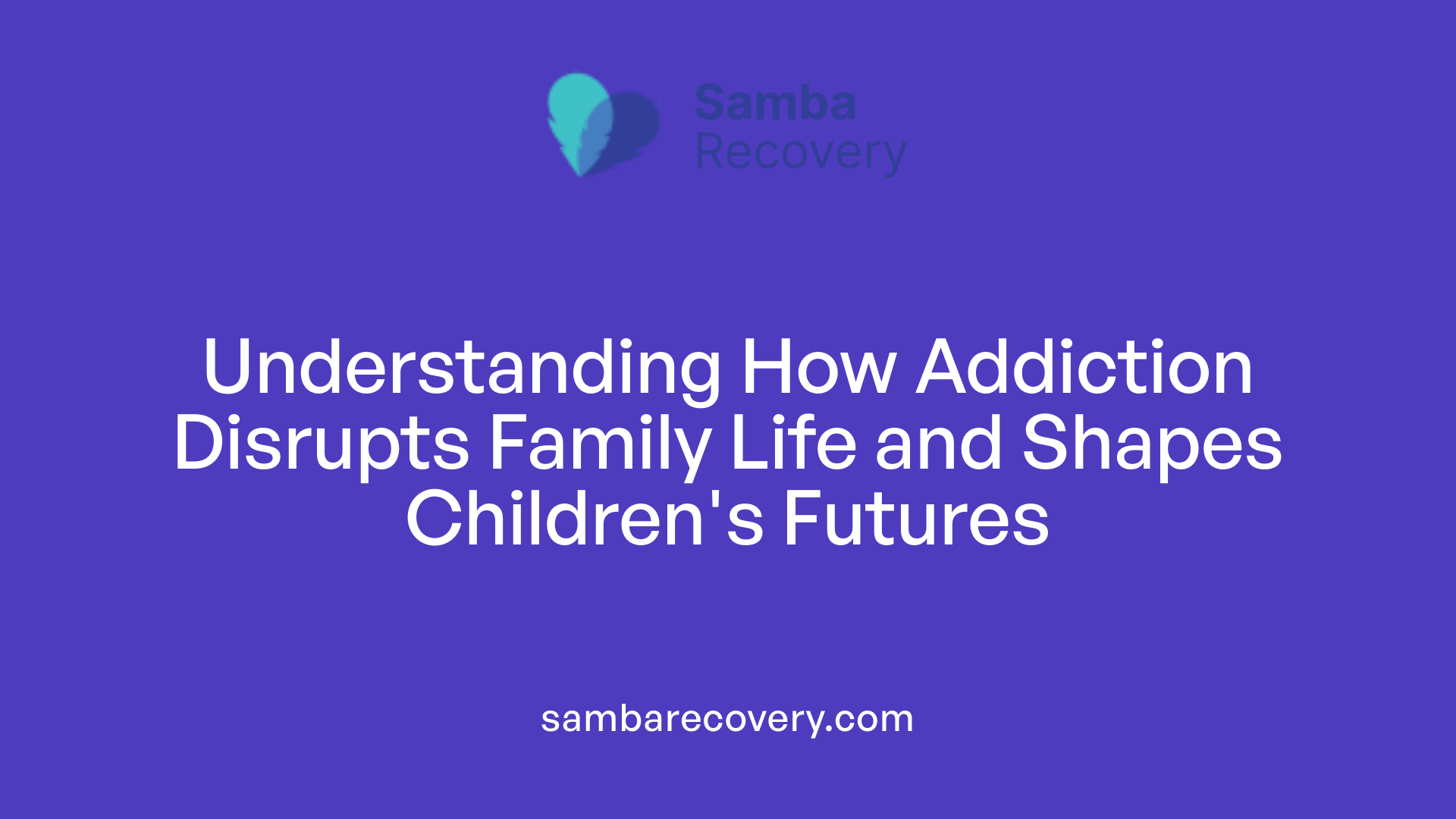
How does addiction affect families and children?
Substance use disorder (SUD) has a profound effect on family life, often leading to chaos and instability. Families facing addiction frequently experience disrupted routines, strained relationships, and heightened emotional tension. Children in these environments are especially vulnerable, as they may encounter neglect, emotional trauma, or even abuse due to the stress and chaos addiction brings.
Children living with a family member who struggles with addiction are at greater risk of developing attachment issues and trauma. The unpredictable nature of addiction can cause children to feel insecure, responsible for family problems, or helpless. These early adverse experiences can result in behavioral challenges, academic difficulties, and social withdrawal.
The emotional toll on children often manifests as anxiety, depression, and low self-esteem. They may also face social stigmatization and isolation from peers. Furthermore, exposure to neglect or abuse increases the likelihood of these children developing their own substance use issues later in life.
Support and intervention are critical. Family therapy and counseling can help repair strained relationships and foster emotional resilience. Providing a supportive environment and educating family members about addiction can help children heal and reduce long-term negative consequences.
Pathways to Healing and Restoring Trust
Recovery from addiction is a multifaceted journey that involves emotional healing, rebuilding trust, and reestablishing healthy communications. Success relies heavily on professional support, ongoing education, and the commitment of both partners and family members to create a sober, nurturing environment. Recognizing the signs of relational deterioration early and adopting effective strategies, such as therapy and setting boundaries, are crucial steps toward healing. Through patience, dedication, and community support, individuals and couples can overcome the destructive effects of addiction, restore their relationships, and foster meaningful, resilient bonds for the future.
References
- The Effects of Substance Abuse on Relationships
- How Drug Addiction Can Affect Relationships | HCRC
- Substance Abuse and Intimate Relationships – aamft
- How Does Addiction Affect Relationships? – GoodTherapy.org
- The Impact of Substance Use on Relationships
- The impact addiction has on family & relationships – Delamere
- Living With Addiction: How to Help a Spouse or Partner | AAC
- Toxic Relationships and Addiction – Gateway Foundation






